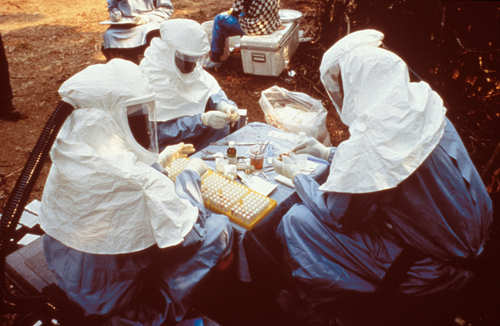Nov 21 2014 Business sector can contribute to Ebola efforts, too
 While governments and NGOs worldwide have mobilized to respond to the Ebola crisis in West Africa, Witney Schneidman, nonresident Brookings fellow at the Africa Growth Initiative in the Global Economy and Development program, recently wrote about the potential for involvement from the private sector, too. He notes that companies and businesses provide an established delivery infrastructure that could be beneficial to delivering medical supplies where they’re needed.
While governments and NGOs worldwide have mobilized to respond to the Ebola crisis in West Africa, Witney Schneidman, nonresident Brookings fellow at the Africa Growth Initiative in the Global Economy and Development program, recently wrote about the potential for involvement from the private sector, too. He notes that companies and businesses provide an established delivery infrastructure that could be beneficial to delivering medical supplies where they’re needed.
For example, in mid-August, more than 20 leading medical companies shipped 40 tons of supplies and protective equipment to Liberia. The airlift was coordinated by the California-based NGO, Direct Relief, and facilitated by FedEx. Companies such as Pfizer, Teva, Merck, Kimberly-Clark and Mylan Laboratories contributed 2.3 million gloves, 65,000 masks and 185,000 tabs of antibiotics. As of September 20, Direct Relief had coordinated 11 shipments of supplies.
The private sector has the ability to leverage resources that benefit a shared goal of all sectors — to combat the Ebola virus and provide care to those affected by it. When we think of intersector collaborations, we imagine partnerships that utilize the resources, ability, and networks of each sector to provide lasting change. Schneidman notes that as the Pentagon, the Department of Health and Human Services, the Centers for Disease Control and Prevention, the U.S. Agency for International Development, and the Department of Transportation work alongside organizations like Doctors Without Borders, the private sector and their influence is neglected.
Equally important is the Ebola Private Sector Mobilization Group (EPSMG), which is a network of more than 40 companies active in West Africa and, especially, Liberia, Guinea, and Sierra Leone. Chaired by ArcelorMittal and including companies such as Chevron, Rio Tinto, and BHP Billiton, the group seeks to provide a single access point for the private sector to help mobilize and coordinate a response. The group’s first principle is to “be part of the region’s long-term economic and social recovery and development.” EPSMG has met with Dr. Margaret Chan, director-general of the World Health Organization, and Deborah Malac, the U.S. ambassador to Liberia, and engaged with organizations such as the U.N. Ebola Task Force, the World Bank and various NGOs.
Only by engaging all sectors can the most tangled, complex, world-wide problems be addressed.
